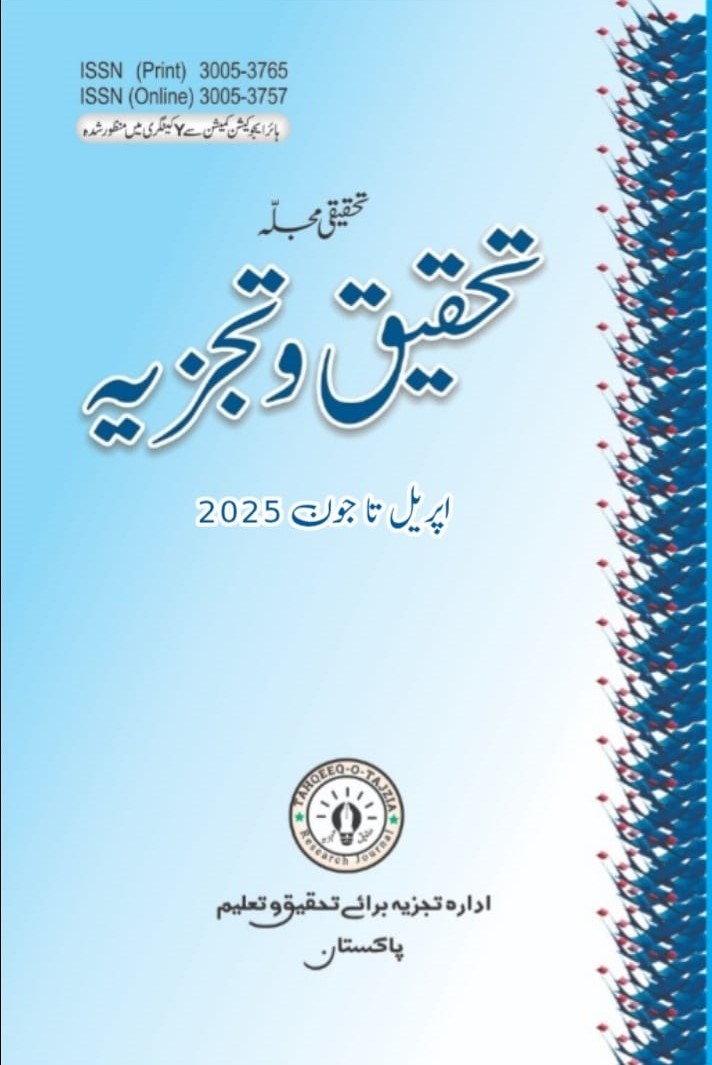Ghalib's Inclusions In Satirical and Elegent Urdu Poetry
Keywords:
Ghalib, , Irony, Inclusion, Lyrics, Verse, Comedy, PoemAbstract
A poem from another poet’s lyrics or his lyrics to include a chorus in his words in such a way that a new lyrics can be created is called inclusion. In addition, use the whole lyrics of a poet in such a way that is to put three verses in every poem in which the thymes of verse is kept in mind. In this way three verses are tied to one of the poems of the lyrics, then a new a new poem or lyrics are also called inclusion. In addition, there is another link to the guidelines in which the chorus with one of the words or a part of it, this is also called inclusion. Mirza Ghalib’s poetry have been utilized by the poets of every age. It is also in the form of a serious poem and in the form of comedy line. Most of the Urdu poets are those who have some lyrics that are said to be the Ghalib’s style. There are some of them merely in Ghalib’s style and some are in the form of inclusion.
References:
- Nadvi, Abdul Salam. Iqbal Kamil. Azamgarh: Dar al-Musannifeen, Shibli Academy, 2009, p. 215.
- Siddiqi, Abu al-Ijaz Hafeez. Kashshaf-e-Tanqeedi Istilahaat (A Dictionary of Critical Terms). Islamabad: Idarah Farogh-e-Qomi Zaban, 2018, p. 64.
- Ghalib, Mirza Asadullah Khan. Diwan-e-Ghalib. Edited by Hamid Ali Khan. Lahore: Al-Faisal Publishers, 2016, p. 187.
- Changezi, Yagana. Ghalib Ma‘azrat ke Saath, pp. 180–181.
- Ghalib, Mirza Asadullah Khan. Diwan-e-Ghalib, p. 63.
- Pasha, Ahmad Jamal, ed. Ghalib se Ma‘azrat ke Saath. Lucknow: Naseem Book Depot, 1964, pp. 192–194.
- Ghalib, Mirza Asadullah Khan. Diwan-e-Ghalib, p. 90.
- Pasha, Ahmad Jamal. Ghalib se Ma‘azrat ke Saath, p. 220.
- Ghalib, Mirza Asadullah Khan. Diwan-e-Ghalib, p. 13.
- Pasha, Ahmad Jamal. Ghalib se Ma‘azrat ke Saath, p. 186.
- , p. 212.
- “Parody: Naqsh Faryadi hai Kis ki Shokhi-e-Tahrir ka,” UrduWeb, https://www.urduweb.org/mehfil/threads/پیروڈی-نقش-فریادی-ہے-کس-کی-شوخئِ-تحریر-کا.118867/, accessed January 10, 2025.
- Hashmi, Hamidullah Shah. Guftah-e-Ghalib (Diwan-e-Ghalib). Lahore: Maktabah Daniyal, 2023, p. 370.
- Raza, Tasleem Ahmad, ed. Ghalib Mazah ki Zadd Mein (Ghalib in the Line of Satire). Islamabad: Sooraj Publishing Bureau, 1996, pp. 250–251.
Biblography:
Changezi, Yagana. Ghalib Ma‘azrat ke Saath.
Ghalib, Mirza Asadullah Khan. Diwan-e-Ghalib. Edited by Hamid Ali Khan. Lahore: Al-Faisal Publishers, 2016.
Hashmi, Hamidullah Shah. Guftah-e-Ghalib (Diwan-e-Ghalib). Lahore: Maktabah Daniyal, 2023.
Nadvi, Abdul Salam. Iqbal Kamil. Azamgarh: Dar al-Musannifeen, Shibli Academy, 2009.
Pasha, Ahmad Jamal, ed. Ghalib se Ma‘azrat ke Saath. Lucknow: Naseem Book Depot, 1964.
Raza, Tasleem Ahmad, ed. Ghalib Mazah ki Zadd Mein. Islamabad: Sooraj Publishing Bureau, 1996.
Siddiqi, Abu al-Ijaz Hafeez. Kashshaf-e-Tanqeedi Istilahaat. Islamabad: Idarah Farogh-e-Qomi Zaban, 2018.
UrduWeb. “Parody: Naqsh Faryadi hai Kis ki Shokhi-e-Tahrir ka.” UrduWeb Forum. https://www.urduweb.org/mehfil/threads/پیروڈی-نقش-فریادی-ہے-کس-کی-شوخئِ-تحریر-کا.118867/, accessed January 10, 2025.
Downloads





